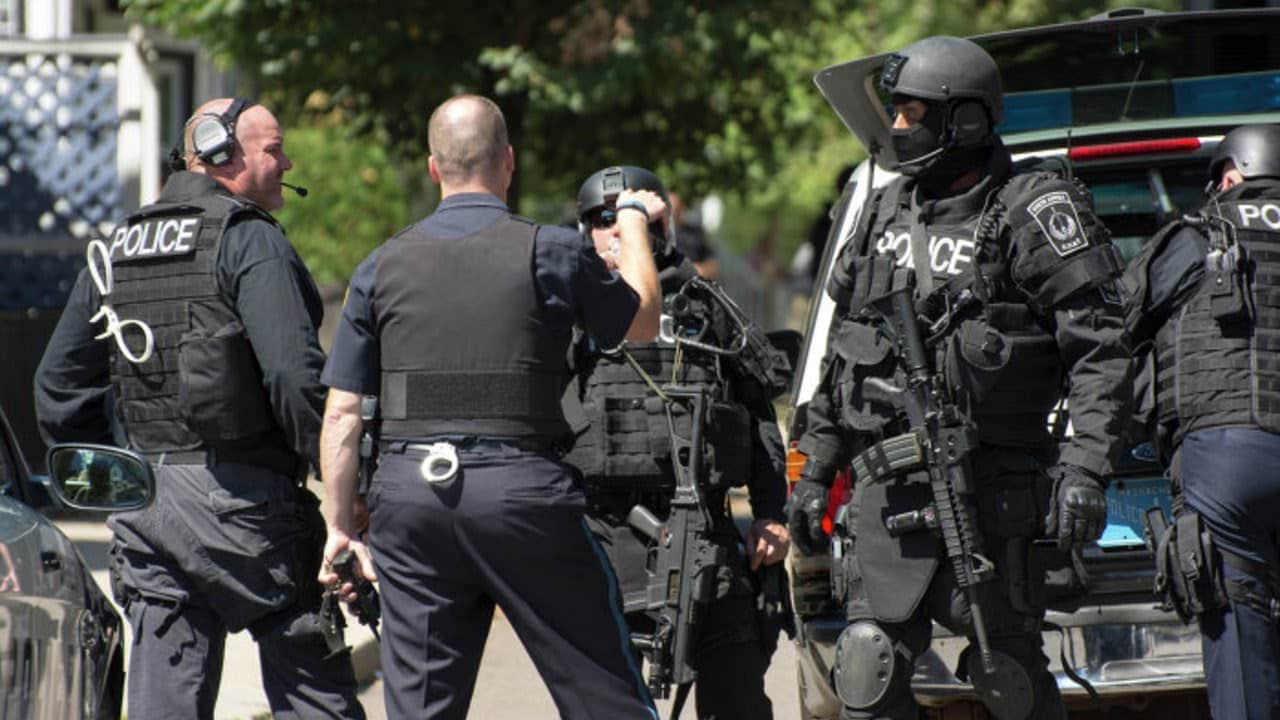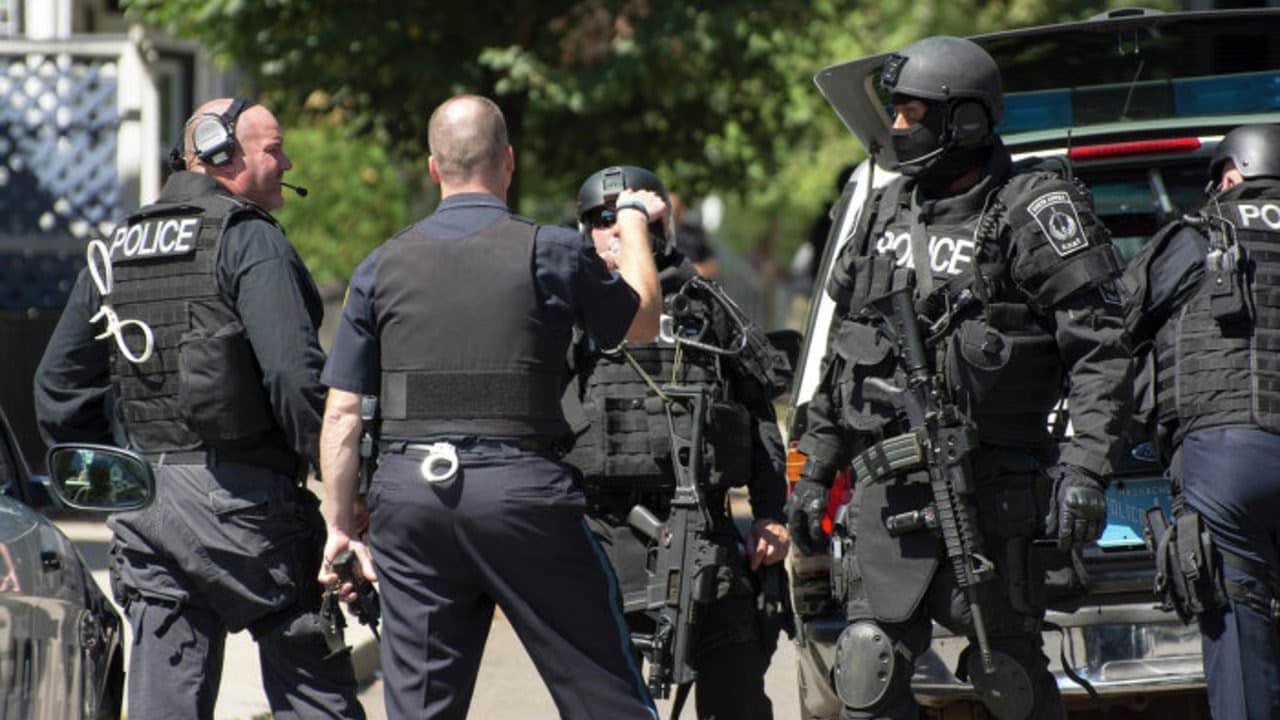We don’t need no education
We don’t need no thought control
No dark sarcasm in the classroom
Teachers leave them kids alone…
All in all it’s just another brick in the wall
All in all you’re just another brick in the wall.
—Pink Floyd, “Another Brick in the Wall”
The nation’s young people have been given front-row seats for an unfolding police drama that is rated R for profanity, violence and adult content.
In Arizona, a 7-year-old girl watched panic-stricken as a state trooper pointed his gun at her and her father during a traffic stop and reportedly threated to shoot her father in the back (twice) based on the mistaken belief that they were driving a stolen rental car.
In Oklahoma, a 5-year-old boy watched as a police officer used a high-powered rifle to shoot his dog Opie multiple timesin his family’s backyard while other children were also present. The police officer was mistakenly attempting to deliver a warrant on a 10-year-old case for someone who hadn’t lived at that address in a decade.
In Maryland, a 5-year-old boy was shot when police exchanged gunfire with the child’s mother—eventually killing her—over a dispute that began when Korryn Gaines refused to accept a traffic ticket for driving without a license plate on her car.
It’s difficult enough raising a child in a world ravaged by war, disease, poverty and hate, but when you add the police state into the mix, it becomes near impossible to guard against the growing unease that some of the monsters of our age come dressed in government uniforms.
The lesson being taught to our youngest—and most impressionable—citizens is this: in the American police state, you’re either a prisoner (shackled, controlled, monitored, ordered about, limited in what you can do and say, your life not your own) or a prison bureaucrat (politician, police officer, judge, jailer, spy, profiteer, etc.).
Unfortunately, now that school is back in session, life is that much worse for the children of the American police state.
The nation’s public schools—extensions of the world beyond the schoolhouse gates, a world that is increasingly hostile to freedom—have become microcosms of the American police state, containing almost every aspect of the militarized, intolerant, senseless, overcriminalized, legalistic, surveillance-riddled, totalitarian landscape that plagues those of us on the “outside.”
If your child is fortunate enough to survive his encounter with the public schools with his individuality and freedoms intact, you should count yourself fortunate.
Most students are not so lucky.
From the moment a child enters one of the nation’s 98,000 public schools to the moment he or she graduates, they will be exposed to a steady diet of
Clearly, instead of making the schools safer, we have managed to make them more authoritarian.
Young people in America are now first in line to be searched, surveilled, spied on, threatened, tied up, locked down, treated like criminals for non-criminal behavior, tasered and in some cases shot.
It used to be that if you talked back to a teacher, or played a prank on a classmate, or just failed to do your homework, you might find yourself in detention or doing an extra writing assignment after school.
That is no longer the case.
Nowadays, students are not only punished for minor transgressions such as playing cops and robbers on the playground, bringing LEGOs to school, or having a food fight, but the punishments have become far more severe, shifting from detention and visits to the principal’s office into misdemeanor tickets, juvenile court, handcuffs, tasers and even prison terms.
Students have been suspended under school zero tolerance policies for bringing to school “look alike substances” such as oregano, breath mints, birth control pills and powdered sugar.
Look-alike weapons (toy guns—even Lego-sized ones, hand-drawn pictures of guns, pencils twirled in a “threatening” manner, imaginary bows and arrows, even fingers positioned like guns) can also land a student in hot water.
Consider that by the time the average young person in America finishes their public school education, nearly one out of every three of them will have been arrested.
Moreover, just as militarized police who look, think and act like soldiers on a battlefield have made our communities less safe, the growing presence of police in the nation’s schools is resulting in environments in which it’s no longer safe for children to act like children.
Funded by the US Department of Justice, these school resource officers have become de facto wardens in elementary, middle and high schools, doling out their own brand of justice to the so-called “criminals” in their midst with the help of tasers, pepper spray, batons and brute force.
Now advocates for such harsh police tactics and weaponry will tell you that school safety should be our first priority.
What they might fail to mention in their zeal to lock down the schools are the lucrative, multi-million dollar deals being cut with military contractors to equip school cops with tasers, tanks, rifles and $100,000 shooting detection systems.
Indeed, the militarization of the police has been mirrored in the public schools, where school police have been gifted with high-powered M16 rifles, MRAP armored vehicles, grenade launchers, and other military gear. One Texas school district even boasts its own 12-member SWAT team.
What we’re grappling with is not merely a public school system that resembles a prison and is treating young people like prisoners but also a profit-driven system of incarceration has given rise to a growth in juvenile prisons and financial incentives for jailing young people.
It has been said that America’s schools are the training ground for future generations.
Instead of raising up a generation of freedom fighters, however, we seem to be busy churning out newly minted citizens of the American police state who are being taught the hard way what it means to comply, fear and march in lockstep with the government’s dictates.
As I point out in my book Battlefield America: The War on the American People, it’s getting harder by the day to convince young people that we live in a nation that values freedom and which is governed by the rule of law.
With every school police raid and overzealous punishment that is carried out in the name of school safety, the lesson being imparted is that Americans—especially young people—have no rights at all against the state or the police.
The bottom line is this: if you want a nation of criminals, treat the citizenry like criminals.
If you want young people who grow up seeing themselves as prisoners, run the schools like prisons.
But if you want to raise up a generation of freedom fighters, who will actually operate with justice, fairness, accountability and equality towards each other and their government, then run the schools like freedom forums. Remove the metal detectors and surveillance cameras, re-assign the cops elsewhere, and start treating our nation’s young people like citizens of a republic and not inmates in a police state.
Reprinted with permission from the Rutherford Institute.


